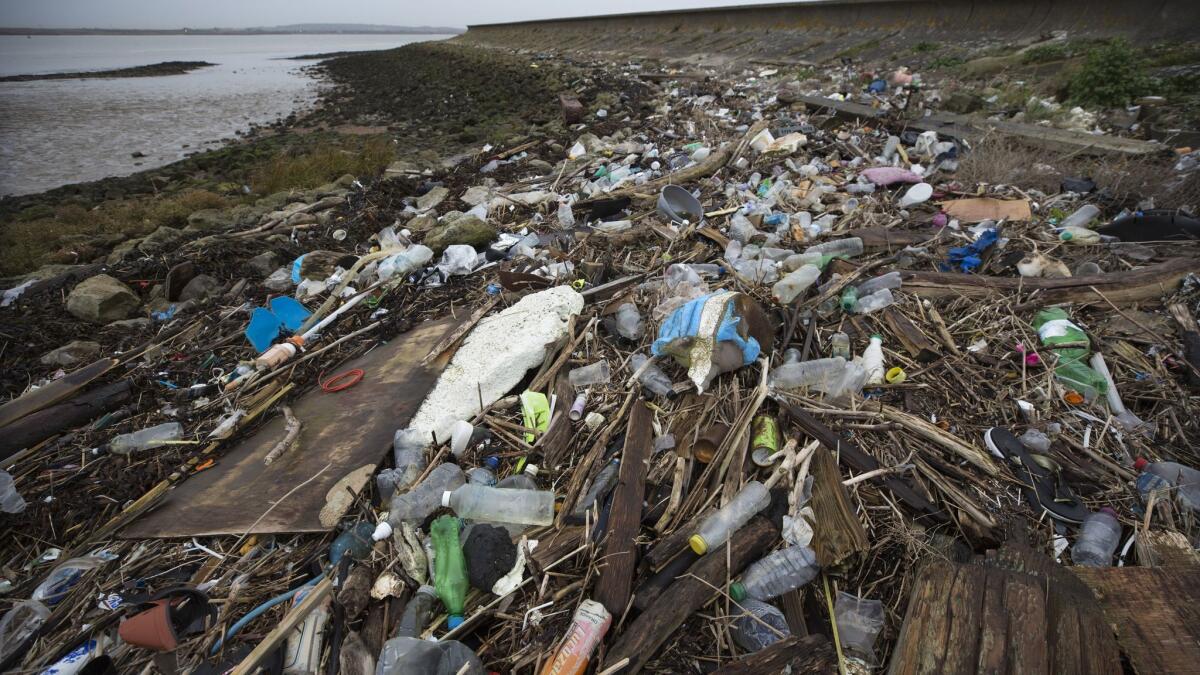Editorial: Plastic trash is not just litter. It’s a climate change problem, too

- Share via
President-elect Joe Biden will have a long to-do list the moment he takes over the White House this month. Plastic trash should be one of his priorities. Here’s why.
Single-use plastic is a climate change issue — as well as an observable, measurable menace to the environment that has only been exacerbated by the pandemic and the need for plastic protective gear. Most plastic is made from fossil fuels, and millions of tons of greenhouse gas emissions are released from the extraction of these resources, and the manufacture and incineration of plastic.
The end life of plastic is just as concerning. Very little of the plastic produced has been recycled, less than 10%. Even more of it has been burned. But the vast majority has been left to molder in landfills and, increasingly, pollute the environment. We hear mostly about ocean plastic and the harm done to marine life that mistakes plastic bags and bits for food. But microplastic is even more worrisome. Plastic doesn’t biodegrade but instead breaks down into tiny particles, which have been found in every corner of the planet, on land and in the air, in drinking water and food sources, and, ominously, in the placentas of unborn fetuses.
We don’t yet have good data about what that means for human health, but considering the toxins used in manufacturing plastic — benzene, lead, endocrine-interrupting phthalates, just to name a few — it can’t be good.
Yet, frustratingly, Congress and past presidents have not given this global environmental disaster the attention it requires. Instead, they have viewed single-use plastic — which constitutes about 40% of plastic used each year — as a litter issue that local governments must solve through better recycling and waste management policies. That attitude must change, because the recent global breakdown of the market for recyclables has made it clear that recycling has never been, nor ever will be, able to keep up with plastic trash use.
What can be done?
That has long been on the minds of environmentalists, who have been lobbying for federal action to reduce disposable plastic for years. To that end, more than 600 environmental, social justice and community organizations have signed on to a sweeping plan that focuses on executive action that Biden can take immediately. So far, Congress has been unwilling to consider serious action on reducing plastic production, perhaps cowed by the powerful petrochemical lobby. The only significant plastic-reduction legislation last year, the Break Free From Plastic Pollution Act, could not even get a hearing in the Senate.
Meanwhile, things are about to get worse. The petroleum industry is pivoting to increased plastic production, with some 30 new plastic-making facilities in the works in the U.S., according to the Center for Biological Diversity. (Among the reasons community and social justice organizations have become involved is that industrial pollution disproportionately affects low-income communities.)
The plan outlines eight steps that include directing federal agencies to use the power of procurement to reduce the amount of disposable plastic they buy, denying permits for expansion of plastic-making facilities and joining international efforts with new or strengthened multilateral agreements aimed at reducing single-use plastic. It’s a good blueprint, but Biden’s team should also look to California for inspiration.
California has been the leader on reducing plastic waste and was the first state to ban single-use plastic bags (a ban that was temporarily rescinded last year as a pandemic measure) and may well be the first state to transform the way goods are packaged. The state Legislature came tantalizingly close to passing the groundbreaking California Circular Economy and Plastic Pollution Reduction Act in 2020, which would have required that products sold in plastic packaging in the state have a proven recycling or composting rate of 75% by 2032. The proposal is still very much alive, and if the Legislature doesn’t pass it in 2021 — though it should — a similar proposal is likely to be on the 2022 statewide ballot.
But California, while influential, can’t solve this crisis alone. The U.S. has been a leader in producing plastic trash; it should be a leader in reducing it as well.
More to Read
A cure for the common opinion
Get thought-provoking perspectives with our weekly newsletter.
You may occasionally receive promotional content from the Los Angeles Times.










